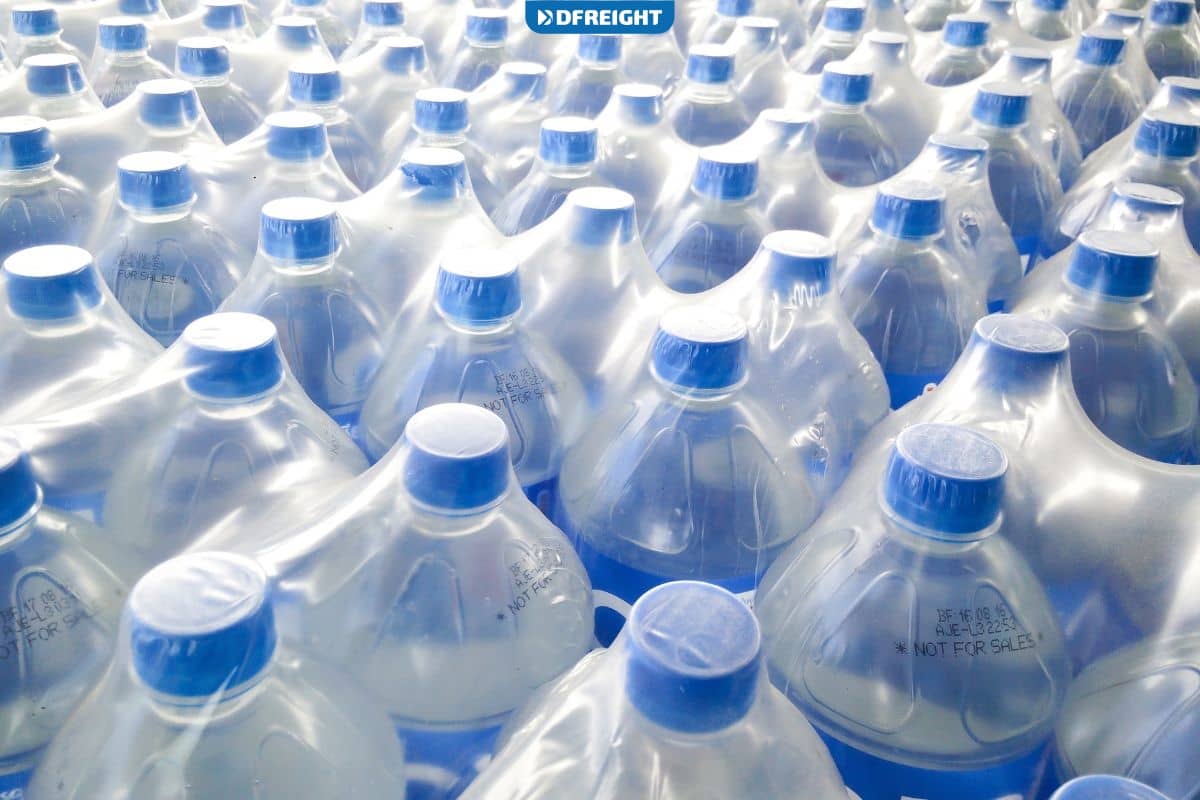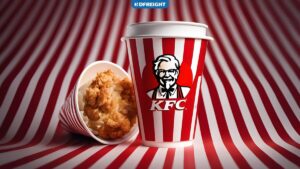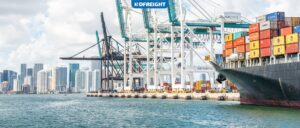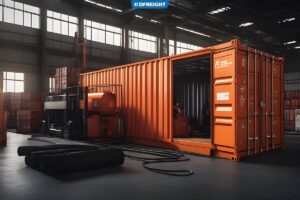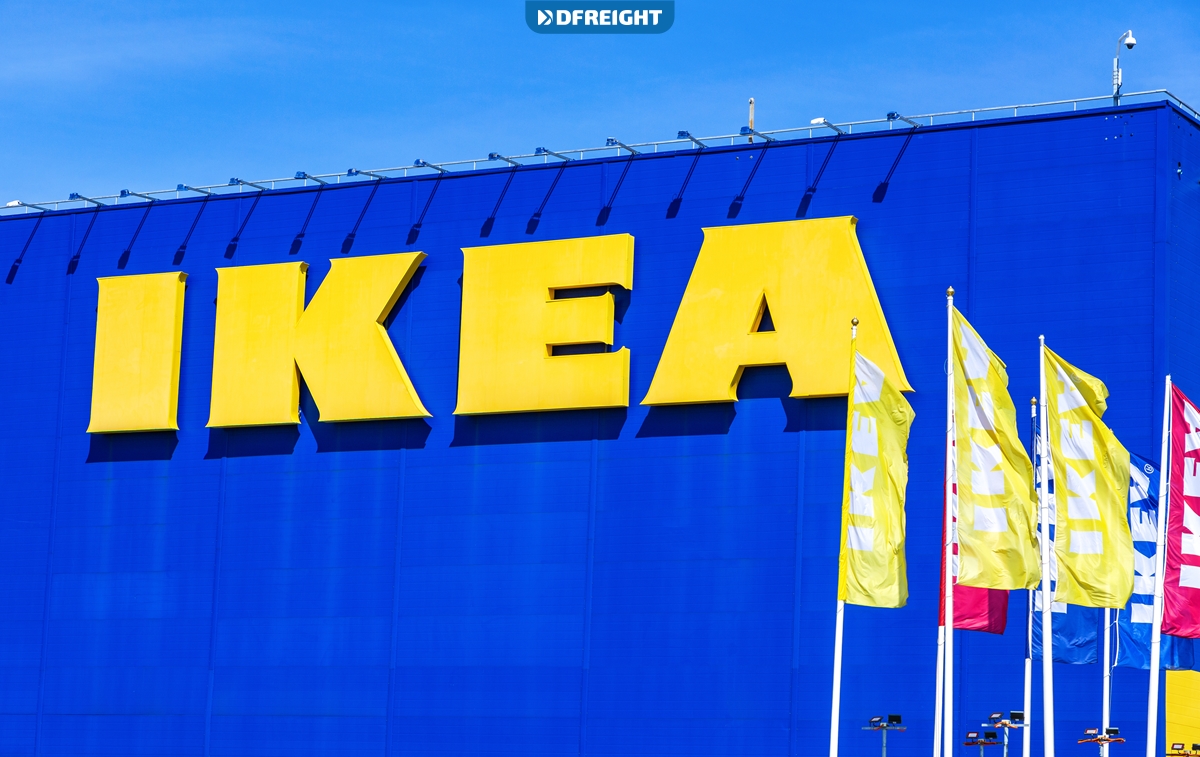In a world where convenience often reigns supreme, bottled water has become a ubiquitous presence in our daily lives. For companies in the Bottled Water industry, ensuring a steady and reliable supply of clean, refreshing water to consumers is both a mission and a passion. As a company within this dynamic industry, you know that it’s not just about the quality of the water; it’s about the journey it takes to reach your customers’ hands. The bottled water market is competitive and the stakes are high, making efficient and effective shipping practices critical to your success.
Discover how DFreight can streamline your bottled water shipping processes and providing efficient solutions for international and domestic logistics.
Table of Contents
Shipping Bottled Water: Challenges and Considerations
Shipping bottled water from production facilities to consumers or distributors may seem like a straightforward task. After all, water is one of the most essential and universally consumed commodities. However, the process of shipping bottled water is not without its challenges and considerations. In this section, we’ll explore some of the key issues that companies in the bottled water industry must grapple with when it comes to shipping their products.
Fragility of Bottles
Bottled water containers, whether made of glass or plastic, are fragile. They are susceptible to breakage, which can lead to water spillage and product loss. Special care must be taken to ensure that bottles are handled, loaded, and transported in a way that minimizes the risk of damage.
Environmental Concerns
In an era of increasing environmental awareness, the bottled water industry faces scrutiny over the ecological impact of its operations, including shipping. The transportation of heavy bottled water over long distances can contribute to carbon emissions and environmental pollution. Companies need to consider and implement eco-friendly shipping practices to reduce their carbon footprint.
Packaging Selection
Choosing the right packaging for bottled water is a critical consideration. Companies need to assess the pros and cons of different packaging materials such as PET plastic, glass, or other sustainable alternatives. The choice of packaging can affect both the product’s integrity during transport and its environmental impact.
Shelf Life and Quality Assurance
Bottled water has a shelf life, and factors like temperature, exposure to sunlight, and storage conditions can impact the product’s quality. Companies must employ quality assurance measures to maintain the integrity of the water during shipping, ensuring that customers receive a product that meets their expectations.
Weight and Volume
Bottled water is heavy, and it takes up a considerable amount of space. This means that shipping costs can be significant, particularly when transporting large quantities over long distances. Companies must optimize their shipping logistics to balance cost efficiency with product availability.
Regulatory Compliance
Bottled water is subject to various regulations, including health and safety standards, labeling requirements, and transportation regulations. Navigating these legal requirements can be complex, and non-compliance can lead to costly penalties and disruptions.
Seasonal Demand
The demand for bottled water can vary seasonally, with increased demand during hot summer months or in regions prone to natural disasters. Companies need to anticipate and plan for these fluctuations in demand to ensure that they can meet customer needs.
Addressing these challenges and considerations requires a well-thought-out shipping strategy. Successful companies in the bottled water industry invest in robust logistics, sustainable practices, and innovative packaging solutions to overcome these challenges. By doing so, they not only ensure the safe and efficient transportation of their products but also meet the expectations of today’s environmentally conscious consumers.
Choosing the Right Packaging for Shipping Mineral Bottled Water
Selecting the appropriate packaging for bottled water is a crucial decision for companies in the industry. The choice of packaging material not only affects the integrity and safety of the product during shipping but also has significant implications for environmental sustainability and brand image. In this section, we’ll explore the various packaging options and considerations when it comes to packaging bottled water.
1. PET Plastic Bottles
Polyethylene terephthalate (PET) plastic bottles are one of the most common choices for packaging bottled water. They are lightweight, durable, and shatter-resistant, making them suitable for shipping. PET bottles are also recyclable, which aligns with sustainability goals.
2. Glass Bottles
Glass bottles offer a premium and environmentally friendly packaging option. They are non-permeable and do not leach any chemicals into the water, ensuring the product’s quality. However, glass is heavier and more fragile than plastic, which can affect shipping costs and safety.
3. Aluminum Cans
Aluminum cans have gained popularity for their recyclability and lightweight nature. They are resistant to UV rays and provide a barrier that protects the water from external contaminants. Cans are also stackable, which can optimize storage space and transportation efficiency.
4. Boxed Water
Boxed water, or carton packaging, is an eco-friendly alternative that has gained attention for its sustainability. These containers are often made from renewable resources and are easily recyclable. However, they may require additional protective packaging for shipping.
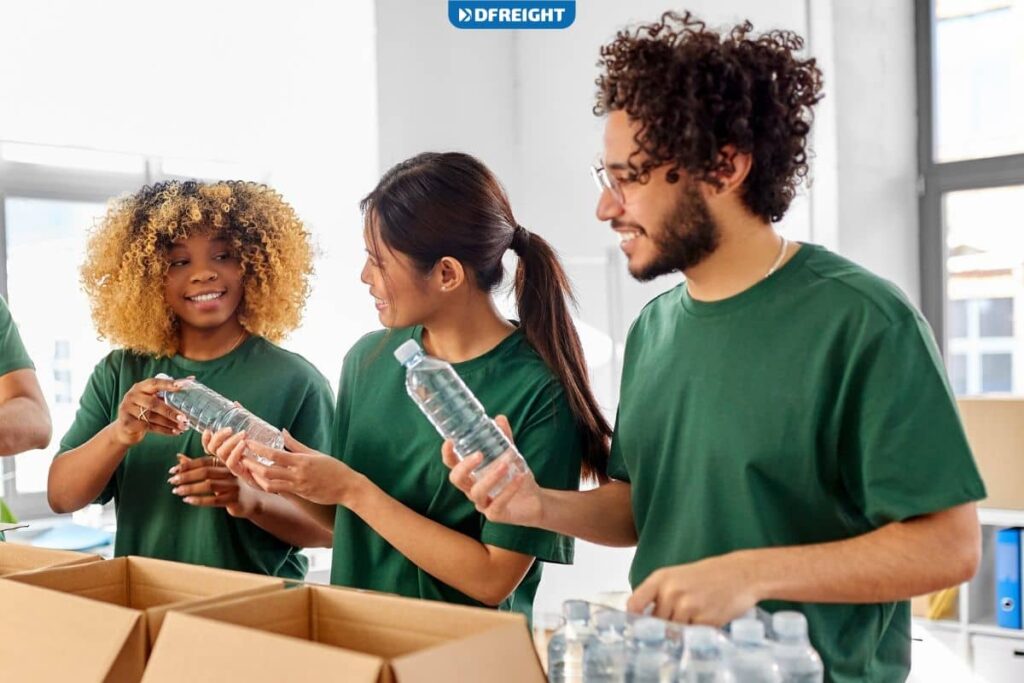
5. Eco-Friendly Packaging
In response to the growing demand for environmentally responsible practices, many companies are exploring innovative eco-friendly packaging solutions. These can include bio-based plastics, biodegradable materials, or even reusable containers. While these options are more sustainable, they often come with higher production costs.
6. Packaging Size and Shape
The size and shape of the packaging are critical considerations. Smaller bottles or packages are convenient for consumers on the go, but larger containers can be more cost-effective and efficient for shipping. Companies need to strike a balance between consumer preferences and logistics.
7. Labeling and Branding
The labeling and branding of packaging play a vital role in marketing bottled water. Clear and attractive labels that convey information about the product source, purity, and sustainability can influence consumer choices. However, it’s essential to ensure that labels meet regulatory requirements.
8. Packaging Innovation
Innovations in packaging technology continue to evolve, offering opportunities to reduce environmental impact and enhance the customer experience. For instance, easy-to-carry multipacks and ergonomic designs can make packaging more convenient for consumers.
When choosing the right packaging for bottled water, it’s important for companies to weigh factors such as product safety, sustainability, cost, and consumer preferences. The packaging not only protects the water but also communicates the company’s commitment to quality and environmental responsibility. As the bottled water industry evolves, the choices made in packaging will play a significant role in shaping its future, influencing both consumer perception and industry sustainability goals.
Ensuring Safe Shipping
Maintaining the safety and quality of bottled water during transportation is paramount. To achieve this, companies employ rigorous quality assurance measures. These can include temperature-controlled shipping to prevent degradation, careful handling to minimize breakage, and secure seals to prevent contamination. Compliance with regulatory standards, including health and safety requirements, is non-negotiable. Companies invest in advanced logistics and monitoring systems to track shipments in real-time, allowing swift response to any issues that may arise. The result is that consumers can trust that the mineral water they receive is not only refreshing but also safe and pure, regardless of the journey it took to reach them.
International Shipping
Expanding the reach of bottled water products across international borders opens up new opportunities and challenges. International shipping involves navigating customs regulations, import/export laws, and varying packaging and labeling requirements in different countries.
It also requires careful consideration of transportation methods, ensuring the product’s quality remains intact during long journeys. International shipping can be a significant growth driver for bottled water companies, but it demands meticulous planning and compliance with global standards and regulations, emphasizing the need for a seamless and efficient supply chain on a global scale.
The Efficiency and Impact of Air Freight in Bottled Water Shipping
When it comes to shipping bottled water, air freight stands out as an exceptional option for ensuring both speed and efficiency in product transit. Bottled water companies often utilize air freight for several key reasons:
- Speed: Air freight is the fastest mode of transportation available, making it ideal for delivering bottled water quickly to international markets or in emergency relief situations. This speed is especially crucial in regions where immediate access to clean drinking water is imperative.
- Global Reach: Air freight networks cover almost every corner of the globe, providing access to a vast array of markets. This enables bottled water companies to expand their reach beyond borders and meet the demands of consumers worldwide.
- Consistency: Air cargo flights operate on fixed schedules, ensuring predictability and reliability in delivery times. This level of consistency can be a game-changer for meeting customer expectations, especially for perishable goods like bottled water.
- Temperature Control: Maintaining the desired temperature for bottled water is essential to preserve its quality and taste. Air cargo often offers temperature-controlled options, which can be crucial for long-haul shipments in various climatic conditions.
- Reduced Handling: Compared to other transportation modes, air freight typically involves less handling. This means fewer opportunities for product damage or contamination during transit, ensuring that bottled water remains in pristine condition upon arrival.
Despite these advantages, air freight may come at a premium cost compared to sea or land transportation. Bottled water companies must weigh the benefits of speedy delivery against the higher shipping expenses. Additionally, sustainability-conscious organizations may consider offsetting the carbon footprint associated with air freight through environmental initiatives.
In conclusion, air freight plays a vital role in the efficient and rapid distribution of bottled water, especially for international shipments and time-sensitive scenarios. Companies in the bottled water industry must carefully evaluate the trade-offs between speed and cost to determine when and where air freight is the optimal choice for their products.
DFreight’s Expertise in Bottled Water Shipping and Air Freight Services
DFreight stands as a distinguished and experienced freight forwarder, specializing in the intricate logistics of shipping beverages and bottled water to and from the UAE, as well as across the globe. With a rich history of successfully handling these delicate and time-sensitive cargo, DFreight has established itself as a trusted partner in the beverage industry. What sets us apart is our cutting-edge online tracking system and user-friendly platform, which provide real-time visibility into the shipping process, ensuring clients can closely monitor the progress of their valuable cargo.
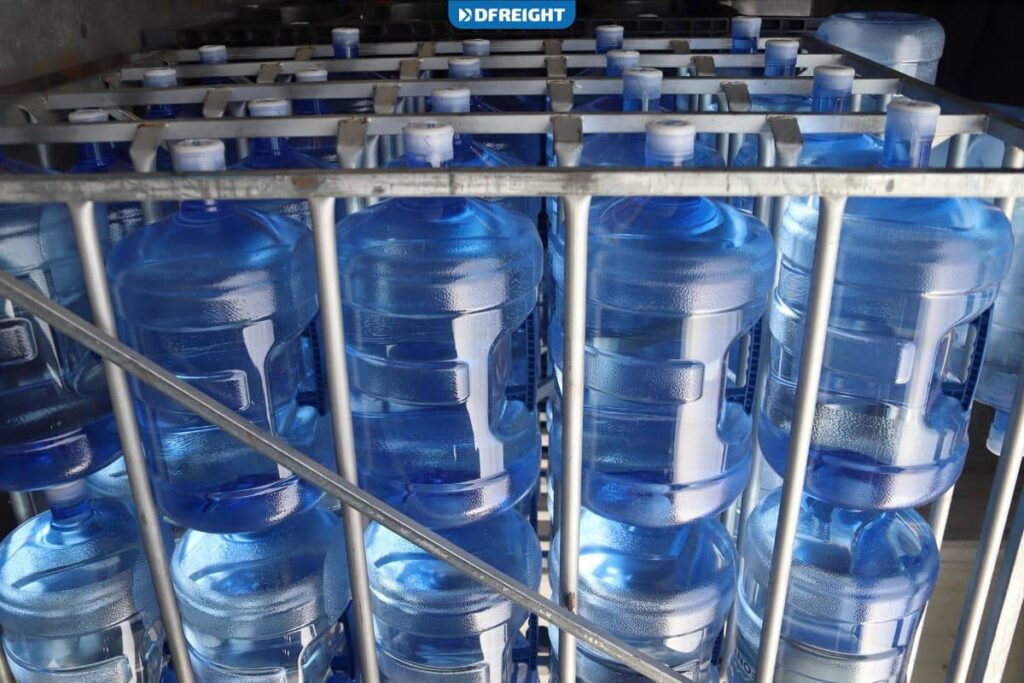
Furthermore, DFreight’s expertise in air freight services is a standout feature, offering swift and reliable solutions to meet the unique demands of shipping bottled water. DFreight’s commitment to excellence and extensive experience in beverage shipping makes us a valuable ally in the journey of transporting beverages and bottled water safely and efficiently.
Conclusion
In conclusion, the shipping of bottled water is a multifaceted process that demands attention to detail, sustainability, and innovation. As we’ve explored, challenges like packaging selection, quality assurance, and environmental considerations play pivotal roles in ensuring that consumers receive safe and pure water. However, these challenges also offer opportunities for growth and improvement within the bottled water industry.
By adopting eco-friendly packaging, optimizing logistics, and staying attuned to changing consumer preferences, companies can not only navigate the complexities of shipping bottled water but also contribute to a more sustainable and responsible future for the industry. In a world where clean water is an essential resource, the commitment to efficient and environmentally conscious shipping practices is a commitment to both quality and the well-being of our planet.
Can I ship bottled water internationally?
Shipping bottled water internationally is possible, but it can be subject to regulations, import/export requirements, and potential delays. It’s essential to research the specific regulations of the destination country.
What is the best packaging material for international shipping of bottled water?
PET plastic bottles are often preferred due to their durability and lightweight nature. They are also widely recyclable. Glass bottles and aluminum cans are viable alternatives, though they have different considerations.
What is the recommended choice for international shipping of bottled water?
Air freight is an excellent choice for speed and efficiency, particularly for perishable goods like bottled water.
How can I navigate import regulations when shipping mineral bottled water internationally?
Work with experienced freight forwarders like DFreight who understand the specific requirements of the destination country. Compliance with labeling and safety standards is essential.
